Top News
The project welcomes immigrants who want to learn Portuguese for free
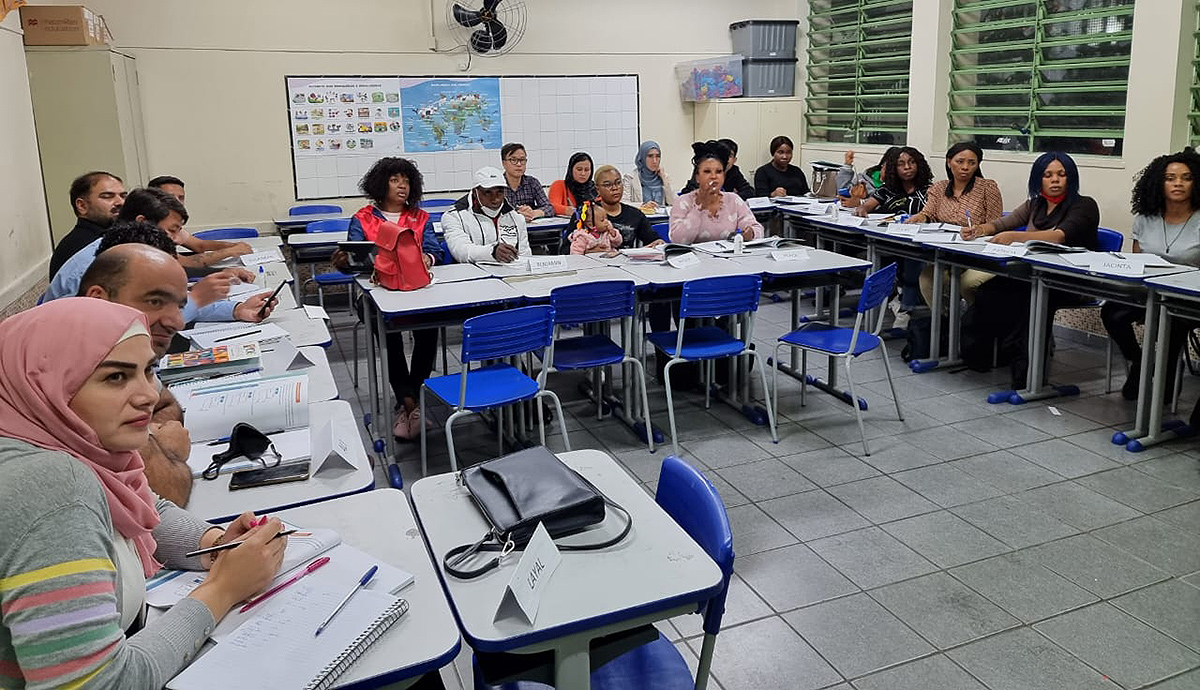
Espaço de Bitita, known as EMEF Infante Dom Henrique, is more than a center for learning Portuguese for foreigners, located in the Caninde district of São Paulo, is a welcoming place where language learning is the gateway to social and professional integration.
In addition to regular classes for children, EMEF opens its doors to face-to-face Portuguese classes for foreigners and the coordination of online language classes. “In distance learning, we have volunteers from other states and other regions of the country, as well as serving students in these conditions,” says school principal and creator of the Portuguese Language for Immigrants project, Claudio Marques da Silva Neto.
The pedagogical method adopted in the project is Portuguese as the Host Language (PLAC), which is designed to teach Portuguese, especially to IDPs who are more vulnerable and for whom Portuguese is not their first language.
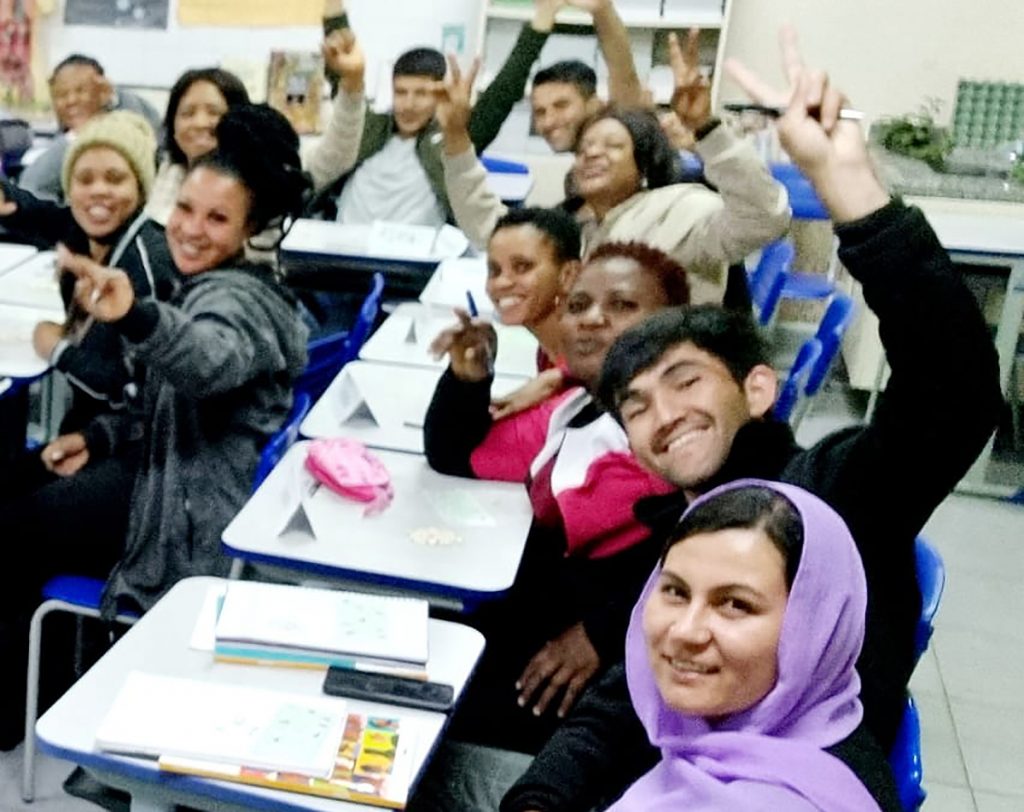
For education manager Sulima Pogrebinsky, who is working on the project, the PLAC method aims to ensure the rights of immigrants in the country and has the goal “for them to learn Portuguese not only in a linguistic aspect, but also in context. Language will integrate you into society by creating conditions for work, study and intercultural exchange.”
Currently, 140 students are studying in the project, which was made possible thanks to the work of 25 teachers and 3 volunteer coordinators. The teaching material is provided by Portas Abertas and is supplemented by pedagogical coordinators. The school, in addition to the location, provides meals for students during the break between face-to-face classes.
The project was born from difficulties
In 2014, the school welcomed its first group of Syrian students and the difficulty of teaching Portuguese to native Arabic speakers was astounding. But as the children progressed and began to understand the language, the family still did not know the language. “Therefore, we decided to create the Portuguese Project for Immigrants, which took place in March 2015 with the help of volunteer teachers,” comments Claudio. Thus, the school began to teach Portuguese to adults in the family.
In 2015, the school was instrumental in drafting the ordinance that established the “Open Doors: Portuguese Language for Immigrants” project, created by the Municipal Department of Human Rights and Citizenship and the Municipal Department of Education to regulate the Law No. of the Municipality on Immigrant Population.
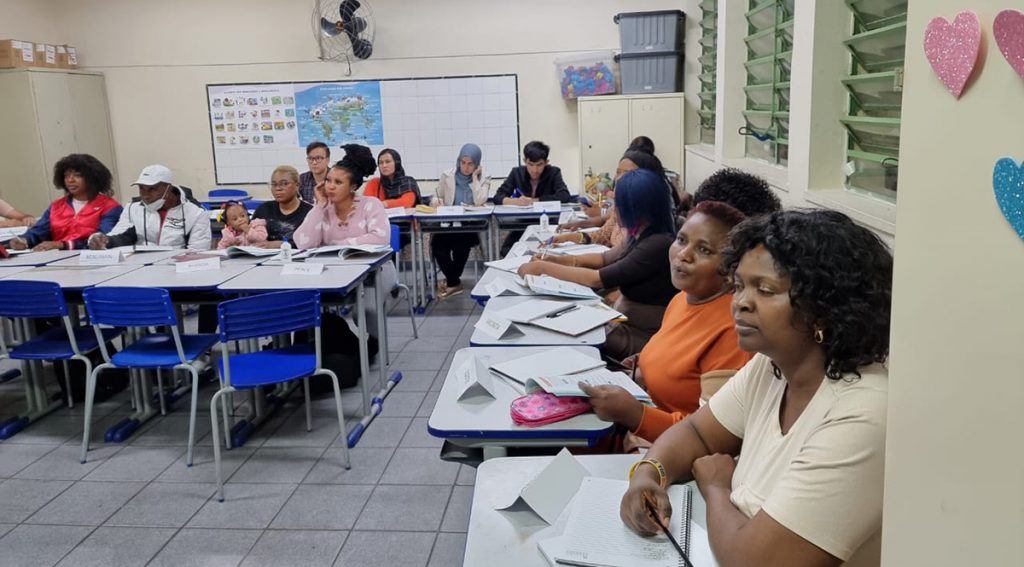
The project was backed by a partnership with the federal government through the National Program for Access to Technical Education and Employment (PRONATEC), but this partnership will only last until the next change of government.
In 2017, without federal support, the mayor’s office allocated only two paid teachers and specialists from the state network to conduct additional classes with foreigners. However, low wages and overwork discouraged the teachers, and the project continued only with the support of volunteers.
Brazil: the path of immigrants
Most foreigners who have settled here consider Brazil a hospitable country. It is a member country of the International Organization for Migration (IOM), the main intergovernmental body in the field of immigration.
Over the past decade, the number of immigrants living in the country has increased by 24.4%, and according to the Observatory for International Migration (OBMigra), today there are about 1.3 million people who have adopted Brazil as their second homeland.
Of these, the UNHCR (Office of the United Nations High Commissioner for Refugees) in Brazil recognizes 60,011 as refugees, i.e. people who had to leave their country due to fear caused by conflicts or persecution that put their lives at risk.
These are refugees from 117 different countries, but the largest flow comes from Venezuelans (48,789), Syrians (3,667), Congolese (1,448) and Angolans (1,363). A new stream has been observed recently after the Taliban came to power in Afghanistan, which is one of the natives of this country, who arrive in Brazil in large numbers every day.
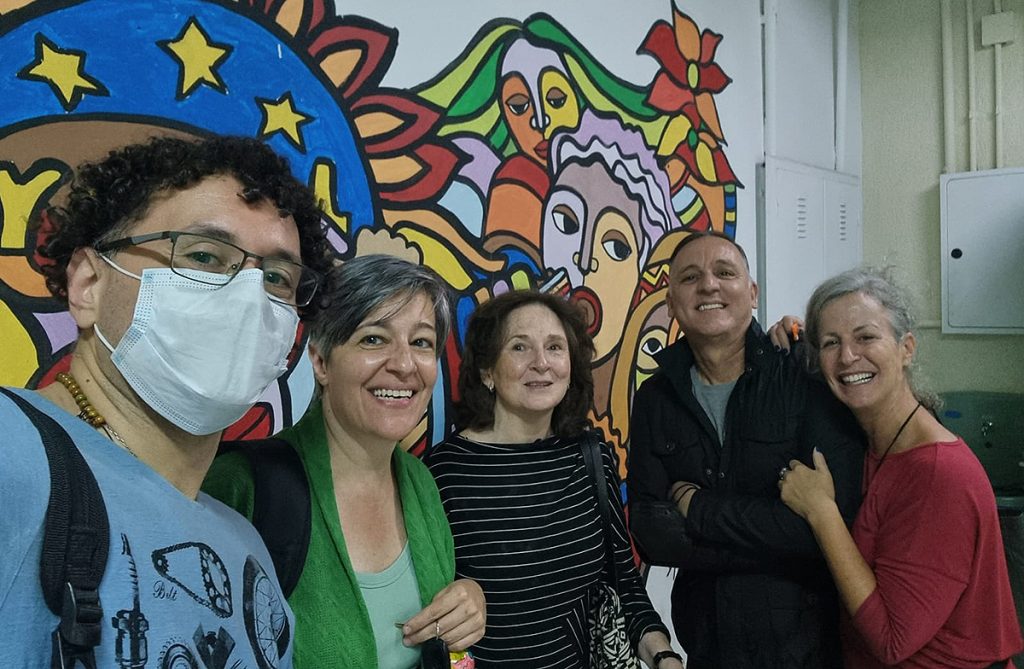
And since the arrival of new groups does not stop, the registration for the Portuguese course in Espaço de Bitita continues, and every month a new group is opened for the introduction to the Portuguese language.
How to take part?
Those interested in learning Portuguese can apply through the application form, which can be accessed at the following link: https://forms.office.com/r/mX4AFW6WTf
Anyone who wants to collaborate by teaching classes or providing pedagogical support can send an email to: [email protected].
Who was Bitite?
Bitita is the childhood nickname of the writer Caroline de Jesus, who lived in a favela near the school. Her work is widely distributed at EMEF, and her book “Quarto de Espejo” is one of the most famous among students and describes events from the painful life of the protagonist and her struggle for a decent life and leave the favela.
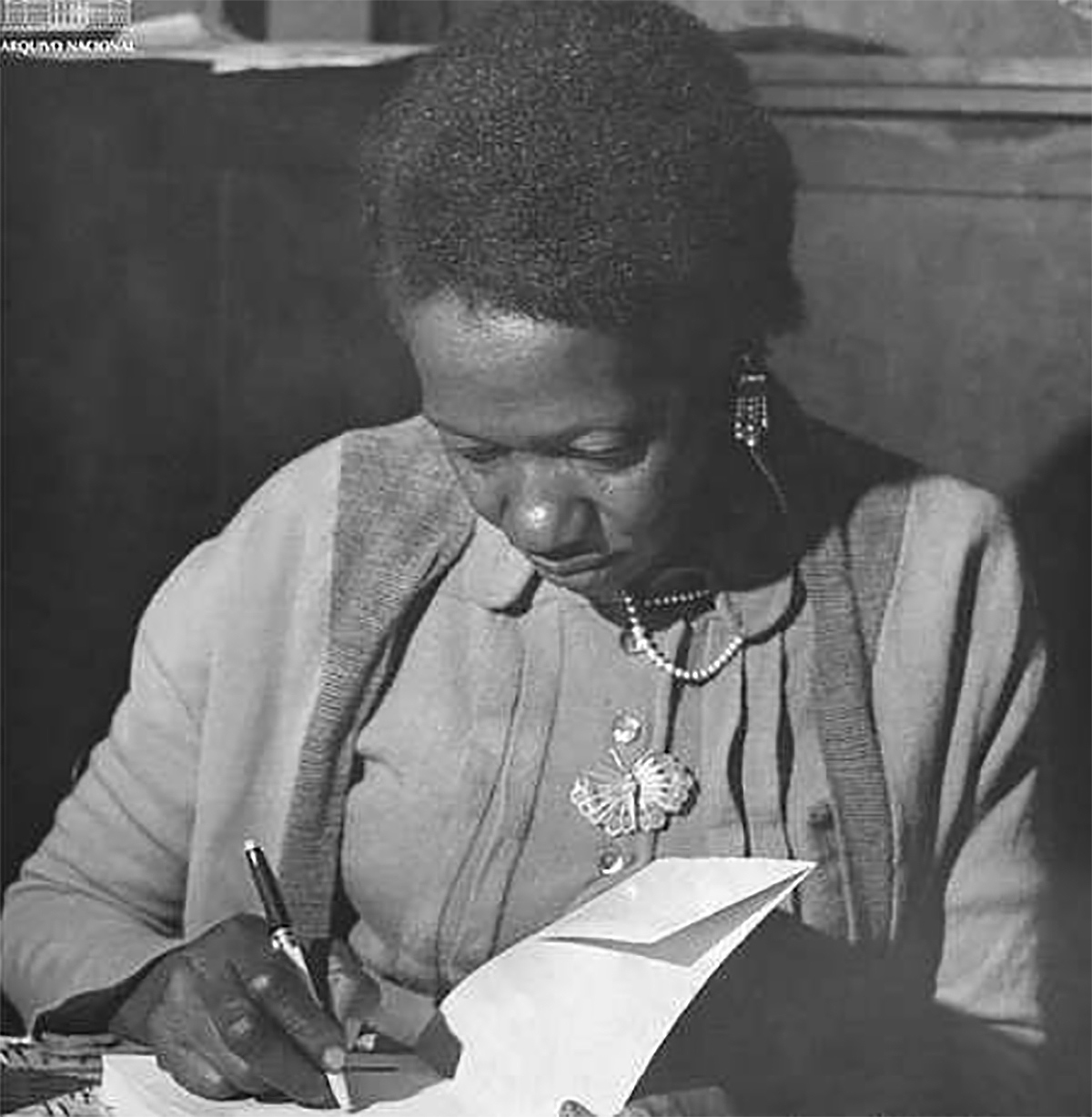
Since the Kaninde area is the backdrop of the book, a close relationship has developed between the school’s students and the work. For this reason, when the school held a student vote to change the name of EMEF from Infante Dom Henrique to something else, the name Espaço de Bitita won with 40% of the vote.
Although the name change process has not yet been approved by the mayor’s office, students and teachers have already unofficially adopted a place name for Espaço de Bitita, which they consider to be more representative and inclusive.

Proud web evangelist. Travel ninja. Creator. Freelance food nerd. Passionate bacon fanatic.
Top News
Portuguese historical films will premiere on 29 December.

Method Media Bermuda will present the documentary FABRIC: Portuguese History in Bermuda on Thursday, December 29 at the Underwater Research Institute of Bermuda.
A spokesperson said: “Method Media is proud to bring Bermuda Fabric: Portugal History to Bermuda for its 5th and 6th showing at the Bermuda Underwater Observatory. In November and December 2019, Cloth: A Portuguese Story in Bermuda had four sold-out screenings. Now that Bermuda has reopened after the pandemic, it’s time to bring the film back for at least two screenings.
“There are tickets Ptix.bm For $ 20 – sessions at 15:30 and 18:00. Both screenings will be followed by a short Q&A session.
Director and producer Milton Raboso says, “FABRIC is a definitive account of the Portuguese community in Bermuda and its 151 years of history, but it also places Bermuda, Acors and Portugal in the world history and the events that have fueled those 151 years.
“It took more than 10 years to implement FABRIC. The film was supported by the Minister of Culture, the Government of the Azores and private donors.
“Bermuda Media Method [MMB] Created in 2011 by producer Milton Raposo. MMB has created content for a wide range of clients: Bermuda’s new hospital renovation, reinsurance, travel campaigns, international sports and more. MMB pays special attention to artistic, cultural and historical content.
More about
Model: Everybody, Entertainment, Movies/Movies, History, News

Proud web evangelist. Travel ninja. Creator. Freelance food nerd. Passionate bacon fanatic.
Top News
CRISTANO RONALDO CAN MAKE UP A GIANT IN CARIOCA AND PORTUGUESE TECHNICIAN SAYS ‘There will be room’

News
This is a fact or event of journalistic interest. This may be new or recent information. This also applies to the novelty of an already known situation.
Article
Mostly original text. Expresses the opinion of the author, but not necessarily the opinion of the newspaper. It can be written by journalists or specialists from different fields.
Investigative
A report that contains unknown facts or episodes with a pronounced denunciatory content. This requires special methods and resources.
Content commerce
Editorial content that offers the reader conditions for making purchases.
Analysis
This is the interpretation of the news, taking into account information that goes beyond the facts told. It uses data, brings events and scenario forecasts, as well as past contexts.
Editorial
Analytical text translating the official position of the vehicle in relation to the facts covered.
Sponsored
This is an institutional article on a topic of interest to the company sponsoring the report.
fact checking
Content that confirms the accuracy and authenticity of the disclosed information or facts.
Context
This is an article that brings subsidies, historical data and relevant information to help understand a fact or news.
special
An exciting report that details the various aspects and developments of this topic. It brings data, statistics, historical context, as well as stories of characters that are affected by or directly related to the topic in question.
Interview
A subject-specific approach in which the subject is presented in a question and answer format. Another way to publish interviews is through threads, where the interviewee’s answer is reproduced in quotation marks.
Criticism
A text with detailed analysis and opinions on products, services and works of art in a wide variety of fields such as literature, music, film and visual arts.

Proud web evangelist. Travel ninja. Creator. Freelance food nerd. Passionate bacon fanatic.
Top News
Maestro de Braga is the first Portuguese in the National Symphony Orchestra of Cuba.

Maestro Filipe Cunha, Artistic Director of the Philharmonic Orchestra of Braga, has been invited to conduct the Cuban National Symphony Orchestra, as announced today.
According to a statement sent by O MINHO, “he will be the first Portuguese conductor to conduct this orchestra in its entire history.”
In addition to this orchestra, the maestro will also work with the Lyceo Mozarteum de la Habana Symphony Orchestra.
The concerts will take place on 4 and 12 March 2023 at the National Theater of Cuba in Havana.
In the words of the maestro, quoted in the statement, “these will be very beautiful concerts with difficult but very complex pieces” and therefore he feels “very motivated”.
From the very beginning, Rachmaninoff’s Piano Concerto No. 2 will be performed by an Italian pianist (Luigi Borzillo), whom the maestro wants to bring to Portugal later this year. In the same concert, Mendelshon’s First Symphony will be performed.
Then, at the second concert, in the company of the Mexican clarinetist Angel Zedillo, he will perform the Louis Sfora Concerto No. 2. In this concert, the maestro also conducts Tchaikovsky’s Fifth Symphony.
“This is an international recognition of my work. An invitation that I accept with humility and great responsibility. I was surprised to learn that I would be the first Portuguese member of the Cuban National Symphony Orchestra. This is a very great honor,” the maestro said in a statement.
“I take with me the name of the city of Braga and Portugal with all the responsibility that goes with it, and I hope to do a good job there, leaving a good image and putting on great concerts. These will be very special concerts because, in addition to performing pieces that I love, especially Rachmaninov and Tchaikovsky, I will be directing two wonderful soloists who are also my friends. It will be very beautiful,” concludes Filipe Cunha.

Proud web evangelist. Travel ninja. Creator. Freelance food nerd. Passionate bacon fanatic.
-
World3 years ago
The Gabby Petito case. Brian Landry set up camp with his family after his girlfriend disappeared
-
Top News4 years ago
Tristan Thompson reacts to Khloé Kardashian’s new appearance
-
Top News4 years ago
TLC ‘sMothered’ recap: ‘Party curled up,’ boyfriend problem
-
Top News4 years ago
Alex Cooper hosts a solo podcast
-
Top News4 years ago
2021 Ford Bronco price: Here’s how much the 2-door and 4-door cost
-
Tech4 years ago
Fall Guys is supplying out a legendary costume and Kudos as an apology present
-
Top News4 years ago
Chiara de Blasio was ‘very cold’ during the arrest of the protest: witness
-
Top News4 years ago
How to Watch Yellowstone Season 3, Episode 2 Live Online









